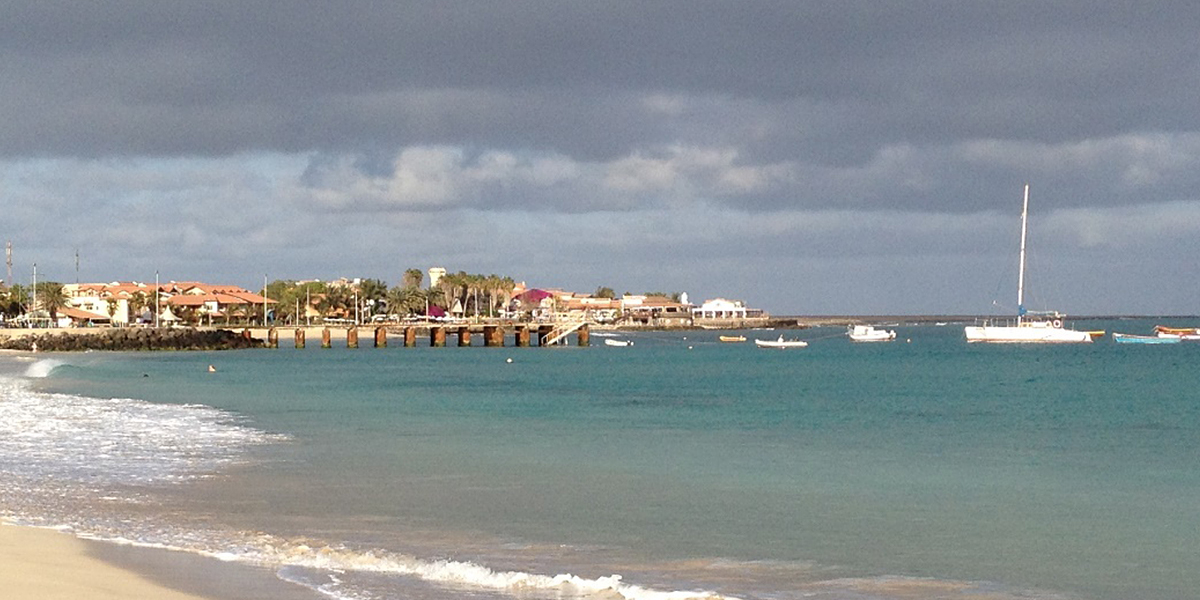Program Overview
MCC’s $65.6 million Cabo Verde II Compact funded the $17.5 million Land Management for Investment (LMI) Project, which aimed to reduce the time for establishing secure property rights and establish more conclusive land information on four islands in Cabo Verde with high tourism development potential: Sal, Boa Vista, São Vicente and Maio. The Legal and Institutional Foundations Activity established a series of national legal, regulatory and procedural changes and created the new Land Management, Information and Technology System (LMITS). The Rights and Boundaries Activity worked to populate LMITS with up-to-date property rights and boundary information.
Download Portuguese translated evaluation brief.
Evaluator Description
MCC commissioned Mathematica to conduct an independent performance evaluation of the LMI Project. Full report results and learning: https://mcc.icpsr.umich.edu/evaluations/index.php/catalog/240.
Key Findings
LMITS and Rights and Boundaries Work
- LMITS is functioning and integrated into the transaction process and used to process most land transactions.
- The National Land Management Institute continued the cadaster work after the compact and has made significant progress since.
Land Disputes and Tenure Security
- The rights and boundary clarification work reduced land-related disputes, helped clarify what land is available for sale, and reduced duplicate land sales.
- Most target households have documented legal rights to their properties, but many rural farmers still do not, due to delays in Património (State) approval of land.
- The evaluation found no differences in perceptions of tenure security by gender, legal status or relationship status. However, quantitative data from LMITS shows that women are still less likely to have their land rights documented on a title.
Transaction Time and Registration Volume
- Transaction time was reduced at the registrar’s office but was not consistently reduced at the notary or municipal chambers.
- Transaction time in the Zones of Integral Tourism Development areas did not change.
- The number of registrations per year has increased significantly on all islands.
Evaluation Questions
This final performance evaluation was designed to answer the following questions:- 1 Do more secure land rights, more efficient procedures, and more reliable rights and boundary information result in increased domestic and/or foreign investment (especially tourism related) in land and property and/or increased productive use of land?
- 2 What is the project’s effect on property values, land tenure security and land-related disputes, time for key property transactions, and volume of key property transactions using the formal land system?
- 1 Is LMITS financially sustainable and used post project? To what extent has the National Land Management Institute worked to clarify rights and boundaries in additional areas and islands post project?
- 2 How do the project’s benefits and/or costs accrue differently to men versus women and to the poor and vulnerable versus the non-poor?
Detailed Findings
LMITS and Rights and Boundaries Work
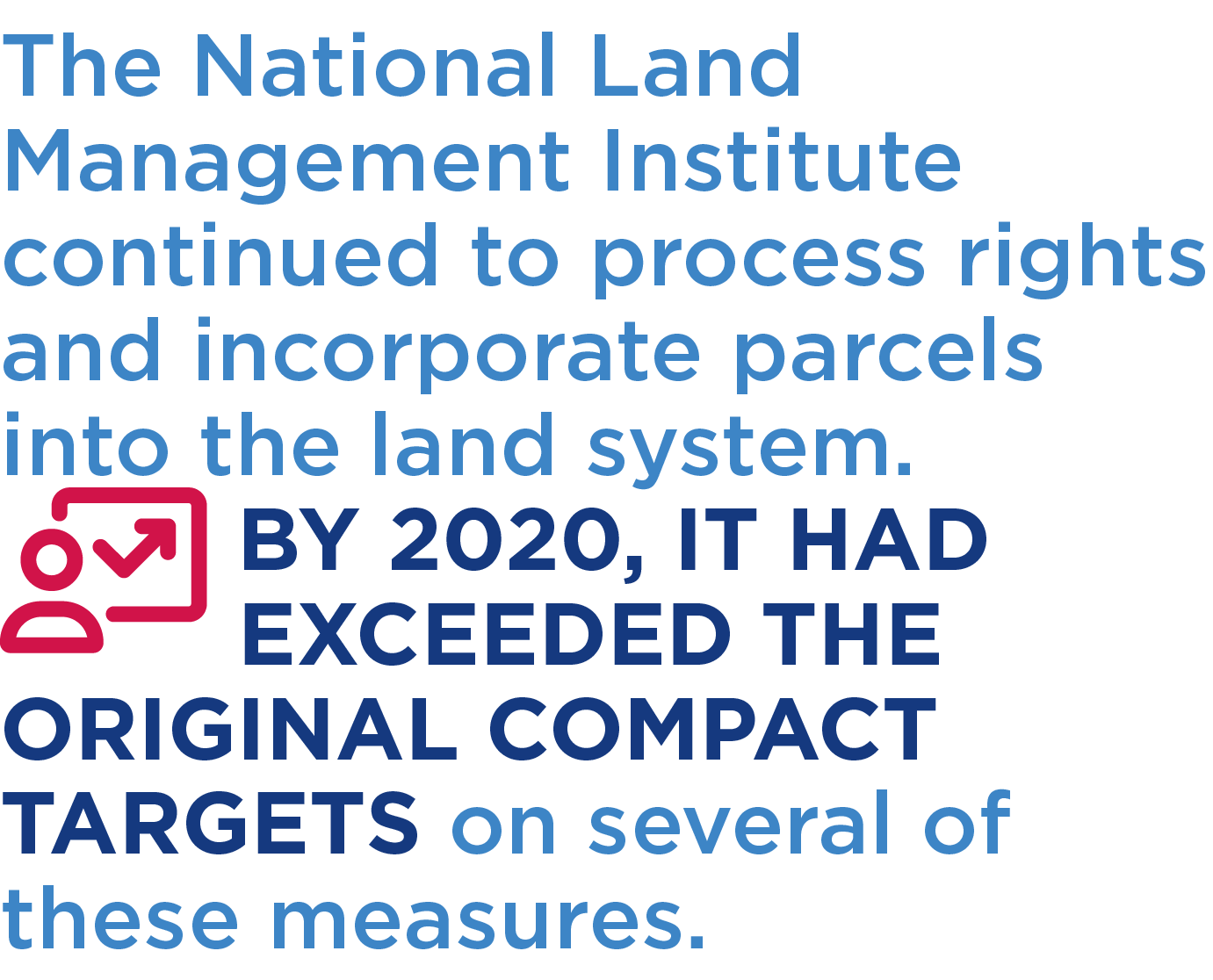
The boundary and clarification work took more time than expected, and many of the targets related to formalizing rights or incorporating parcels into LMITS were not met by the end of the compact in 2017. Nevertheless, after the compact, the National Land Management Institute continued to process rights and incorporate parcels into the land system. By 2020, the National Land Management Institute had exceeded the original compact targets on several of these measures.
Land Disputes and Tenure Security
The boundary clarification work measured the boundaries of people’s property, verified the measurements with location maps, and clarified any boundary disputes among neighbors. While there were many pre-existing boundary and title disputes, and new disputes uncovered during the cadaster work, the evaluation found that these activities resolved the majority of these conflicts. However, respondents noted that the process did not solve all disputes. For example, there are still disputes over inheritance and disputes arising from the separation of couples.The project helped many households register their properties and obtain a title. Some households noted the importance of the interventions in clarifying boundaries, helping them understand rights, and having a title to document ownership or obtain a bank loan—all of which contributed to their increased perceived tenure security. Other interviewees did not feel at risk of losing their property rights even prior to receiving their documentation through the project, and their perceptions of their tenure security have not changed. Nevertheless, rural landowners, including farmers, face unique challenges when trying to register their property and obtain a title, including the lack of information and documentation to prove their rights to the land and a long approval process at the Património.
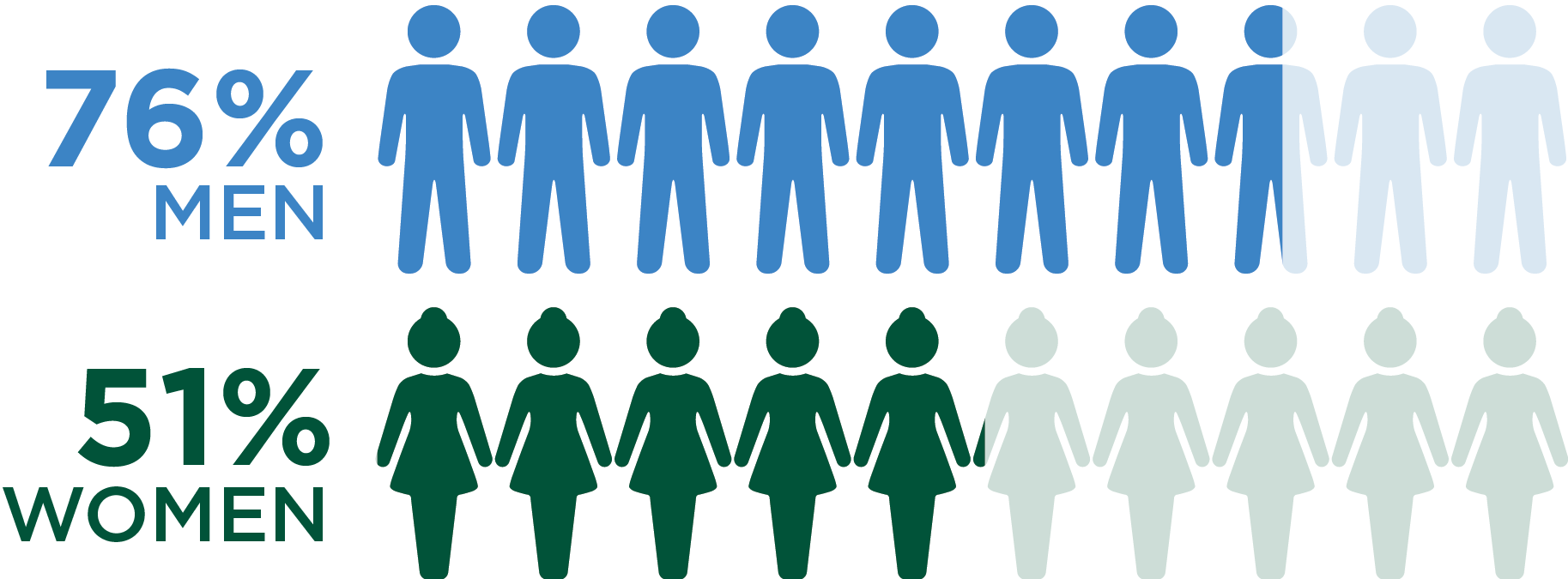
Men versus women named on titles as owner or co-owner
Transaction Time and Registration Volume
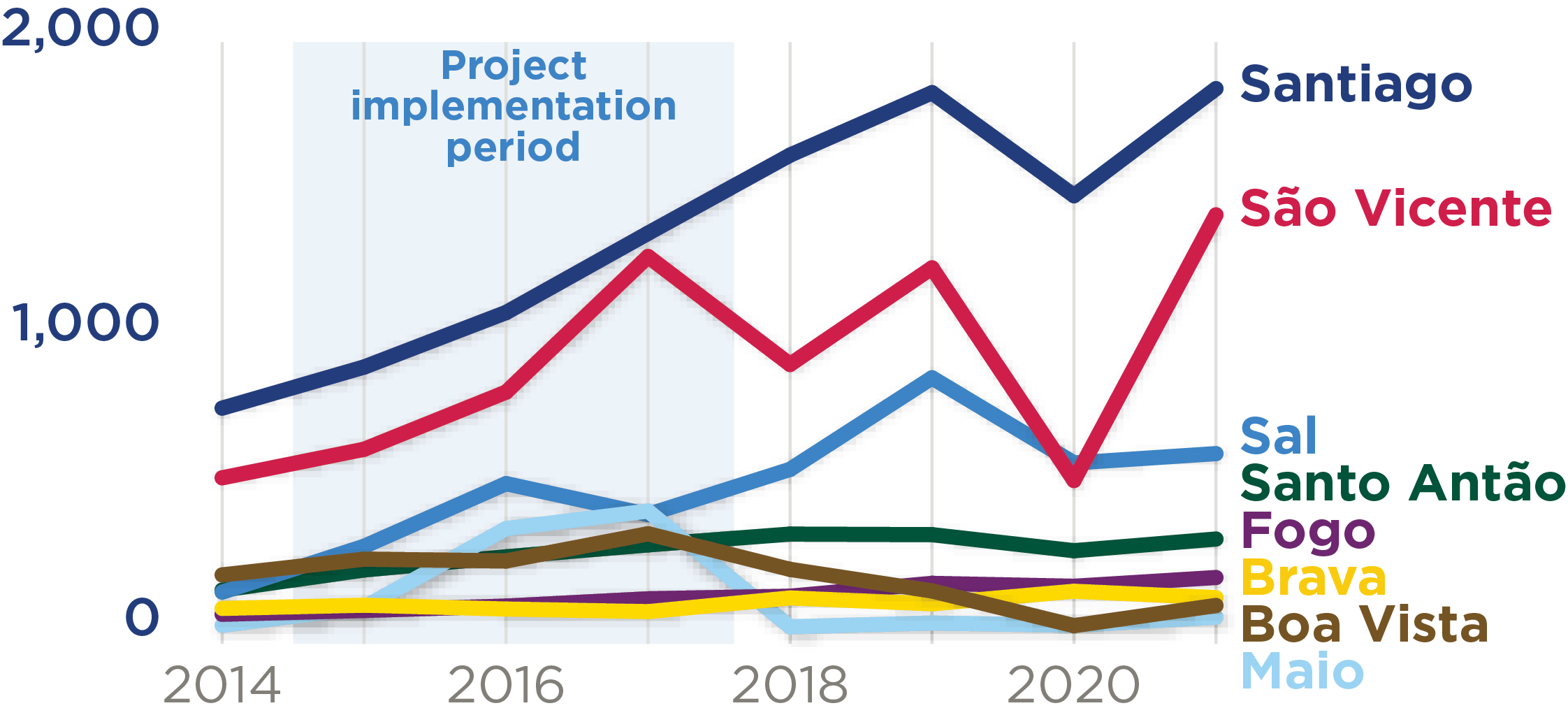
Number of sporadic property registrations per year at registries, by island
Transaction time was not consistently reduced at the notary or municipality. Barriers to reduced transaction time at the notary and municipality include increased efforts related to continuing boundaries and clarification work, insufficient staff, Internet connectivity, and the need for additional capacity building.
Transaction time in the Zones of Integral Tourism Development regions did not change because most of the land sales must be approved through the Património, whose processes remain unaffected by the project.
Evaluation data suggests that the project contributed to an increase in the volume of property registrations, but the evaluation was unable to determine how much of the increase was a result of the project versus the new registration law adopted post compact that requires people to title their land.
Economic Rate of Return
The evaluator was unable to recalculate the economic rate of return (ERR). The feedback on the validity of the ERR that MCC produced, in light of the evaluation findings, is included below.- The anticipated decrease in transaction time and increase in land purchases for commercial tourism investments did not materialize.
- The benefits that did materialize under LMI, as part of the project logic, were not included in the ex-ante cost-benefit analysis (CBA) model, and the necessary quantitative data to estimate their economic value were not collected.
- The potential benefits for these households and businesses were not included in the ex-ante CBA model.
MCC Learning
- Land information system developers need to have specific expertise related to the development of land IT systems and need to collaborate closely with end users to ensure that the system effectively addresses user needs and the legal requirements of the land registration process.
- Securing land rights for women requires comprehensive approaches to address the specific legal and sociocultural contexts including legal, administrative, management information systems, and social and behavior change dimensions.
Evaluation Methods
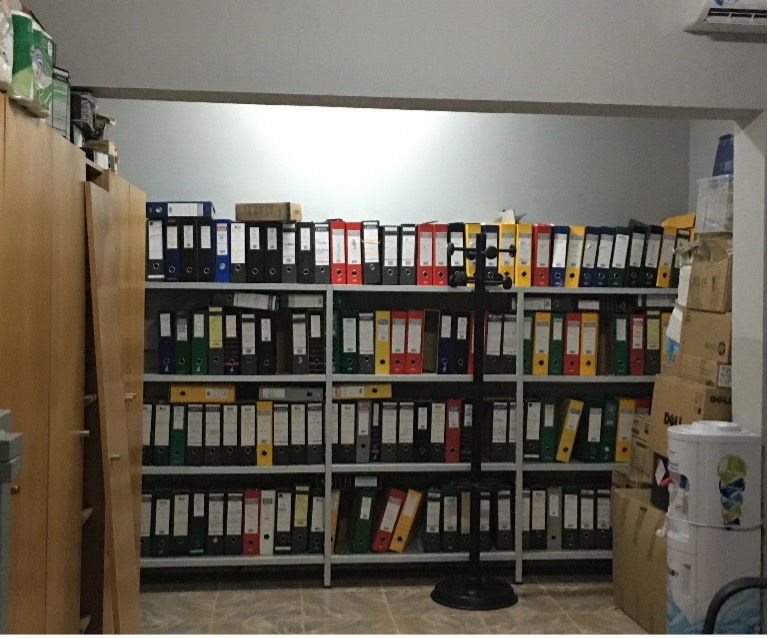
Archive of property transactions at the notary/registry office in Boa Vista
A pre-post analysis, which used administrative data to examine changes in outcomes, such as transaction time and volume, before the MCC-funded project was implemented (2012–2014 on Sal and 2012-2015 on Boa Vista, Maio and São Vicente) and after the compact ended (2018–2021). This analysis focused on the four targeted islands and three non-targeted islands that could be affected by the Legal and Institutional Foundations Activity alone.
A qualitative study that drew on over 100 key stakeholder interviews, including beneficiary households and businesses. These interviews covered all four targeted islands and three non-targeted islands. The household and business interviews focused on Sal and Boa Vista. Mathematica conducted a document review, which primarily focused on reports from the implementers of MCC LMI project activities, as well as provided information on aspects that were implemented smoothly and implementation challenges.
A qualitative multisite case study of at least 10 large commercial investments inside Zones of Integral Tourism Developments on the four targeted islands. Mathematica conducted one round of data collection from these stakeholders’ four-year post-compact activities (2021–2022) to capture experiences in the years leading up to the intervention and in the years immediately following it.
2022-02-2737


